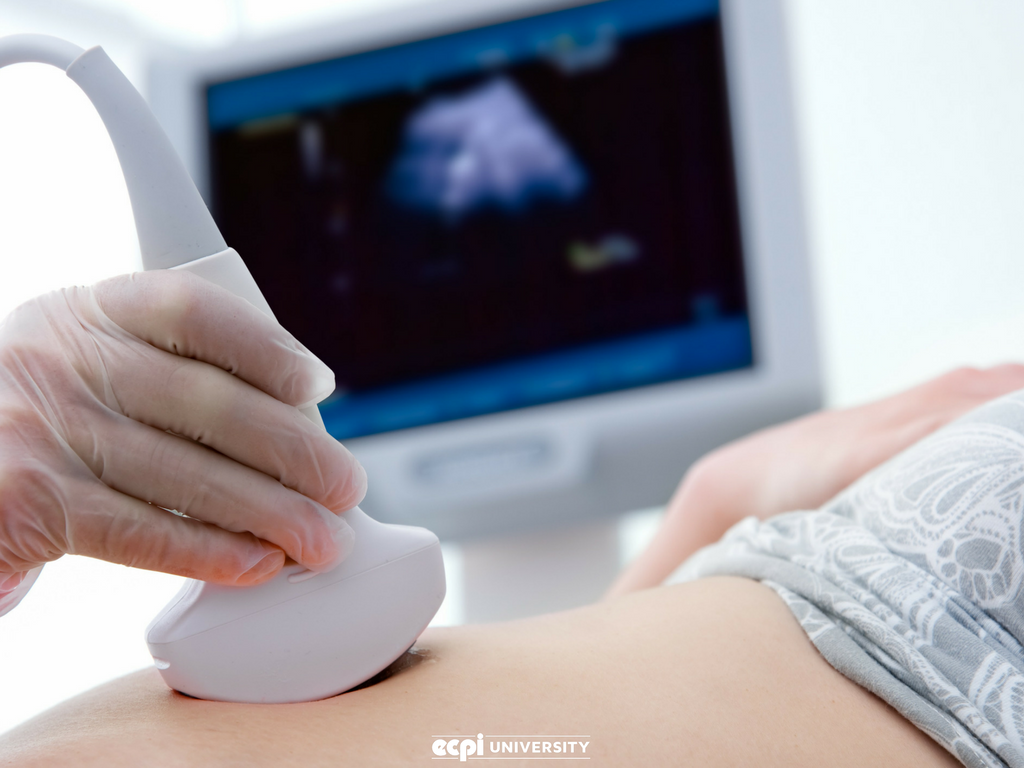Obstetric Sonographer: Definition
Diagnostic Sonography is a type of real-time imaging technology which uses high-frequency sound waves to process images and movements from within the body. This technology is invaluable in the diagnosis and treatment of many conditions in the abdomen, breast, heart, blood vessels, and musculoskeletal system. Sonographers assist physicians in making diagnoses–or offering proud parents the first glimpse of their new baby before birth.
This is the most common application of sonography. Obstetric sonography involves performing an ultrasound on a pregnant patient to determine information about an unborn fetus. The data provided by the scans include the gestational size and weight, gestational development, and estimated date of delivery. Sonograms are also used to detect and monitor fetal abnormalities and pregnancy complications. Generally, obstetric sonography plays a key role in ensuring that the patient or fetus is healthy.
Obstetric sonography can be performed on the expectant patients in two ways- transabdominal (external) and transvaginal (internal) ultrasounds. Transabdominal, which is the most common type, involves the application of gel to the lower abdominal region of the patient and the use of an ultrasound scanner. Conversely, transvaginal ultrasounds yield clearer images and are only done for a select number of reasons. For instance, if the mother has had pregnancy complications before, this is the best method. In this case, a transducer is inserted into the vagina of the expectant parent. The technology doesn’t use radiation and has no side effects on the patient and the fetus.
Educational Requirements
Becoming an obstetric sonographer (OB ultrasound technician) can be done through a formal education program. Those wishing to work in this field should obtain an associate degree in diagnostic medical sonography.
The educational path to become an obstetric sonographer starts with training in the field of diagnostic medical sonography. Typically, the coursework will cover pertinent subjects including medical ethics, patient care, physiology, physics, and anatomy. Mastering regulatory, ethical, and legal topics will also be necessary. One can then obtain specialized training in the field of obstetric sonography.
Students also learn to identify and examine pathologies of the ovaries, uterus, and fetus. Examples of classes students may complete include medical terminology, reproductive scanning, superficial structures and neonatal brain, practical aspects of sonography, and applications of 3D obstetrical ultrasound. An associate degree program involves classroom coursework as well as hands-on training, and this means that students are equipped with the relevant knowledge and practical experience. Since sonographers work closely with patients all day, a formal degree program can help develop the soft skills needed to interact positively with a diverse group of patients--patients who may be receiving excellent or devastating news.
Individuals already working in the sonography field who want to specialize in the obstetric sonography field would do well to enroll in an associate degree program. Those who wish to get into more administrative roles should pursue a Bachelor’s degree. Formal education is necessary in preparing students to work in areas such as physician’s offices, hospitals, imaging centers, and laboratories.
Credentials
Most employers prefer sonographers who are licensed and certified by the leading accrediting organization, the American Registry for Diagnostic Medical Sonography (ARDMS). While there are states that require sonographers to be certified, the certification is not legally required by some states. Certification comes through meeting experiential and educational prerequisites and completing a certification exam.
Roles and Responsibilities
As an obstetric sonographer, there are a wide array of duties that you may be expected to perform. Some of them include preparing patients for the procedure, determining which equipment to use, and properly positioning the patient. During and after the sonogram procedure, you’ll examine the images to decide on the one that complies with the requirements of the physician. It’s also a sonographer’s job to keep the equipment in good working condition, as well as to maintain the patient’s records.
Qualities of an Obstetric Sonographer
While OB ultrasound technicians have to have a firm background in physics and biology, be skillful at using and maintaining ultrasound technology, and be detail-oriented, they also have to be personable and compassionate. This is imperative as expectant parents, and their partners may be experiencing a range of emotions from fear to excitement when going in for an obstetric ultrasound. Therefore, while answering any questions posed by the patients, the sonographers should retain a calm and professional demeanor.
Obstetric sonographers should be prepared for a range of scenarios; some situations will be scary and tragic for the expectant parents while others will be cause for celebration. OB ultrasound technicians should also be continuous learners. This does not mean formal education only; it means going out of their comfort zone to acquire more knowledge by learning from more senior and experienced for guidance, including asking questions in any case of uncertainty.
Are you interested in obstetric sonography? If you want to earn an Associate of Applied Science in Diagnostic Medical Sonography, consider ECPI University for the education you’ll need to get started. For more information, connected with a friendly admissions counselor today.
It could be the Best Decision You Ever Make!
DISCLAIMER – ECPI University makes no claim, warranty, or guarantee as to actual employability or earning potential to current, past or future students or graduates of any educational program we offer. The ECPI University website is published for informational purposes only. Every effort is made to ensure the accuracy of information contained on the ECPI.edu domain; however, no warranty of accuracy is made. No contractual rights, either expressed or implied, are created by its content.
For more information about ECPI University or any of our programs click here: http://www.ecpi.edu/ or http://ow.ly/Ca1ya.





